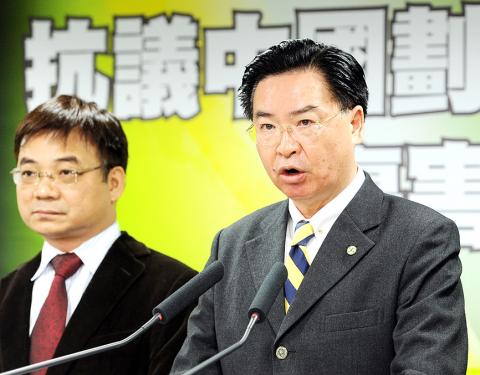China’s demarcation of an East China Sea air defense identification zone (ADIZ) that includes the disputed Diaoyutai Islands (釣魚台) is a clear act of expansionism that risks destabilizing the Asia-Pacific region and the world’s failure to take substantial actions will only embolden China to launch military aggression against its neighbors, the Democratic Progressive Party (DPP) said yesterday.
At the instruction of DPP Chairman Su Tseng-chang (蘇貞昌), DPP Policy Research Committee executive director Joseph Wu (吳釗燮), International Affairs Department director Liu Shih-chung (劉世忠), China Affairs Department director Hung Tsai-lung (洪財隆) and former National Security Council (NSC) consultant York Chen (陳文政) made the remark at a press conference in Taipei yesterday morning.
The party issued three demands to President Ma Ying-jeou’s (馬英九) administration: that the government lodge a stern protest against China’s unilateral declaration of the ADIZ in an attempt to challenge the “status quo” in the region; that it maintain close contact with concerned allies to work out a plan for cooperative efforts and pay close attention to the matter; and that it work to ensure uninterrupted patrols by Taiwan’s fighter jets and naval vessels in the nation’s own ADIZ in waters off northeastern Taiwan and take substantial measures to defend the nation’s sovereignty and national security.

Photo: Fang Pin-chao, Taipei Times
China’s unilateral demarcation of the ADIZ, which overlaps that of Taiwan’s and Japan’s, not only runs counter to international norms, but also underlines its apparent attempt to unilaterally change the “status quo” in the region, Wu said.
“Such an action may escalate tensions and seriously jeopardize the peace and stability in the Asia-Pacific region. The DPP solemnly remonstrates against such irresponsible and provocative behavior and demands that China immediately retract its ADIZ announcement,” Wu said.
Wu said history had shown that weakness only breeds more aggressive expansion and costs nations more dearly afterward.
“Forty-eight hours have passed [since China’s ADIZ announcement on Saturday]. However, the Ma administration’s responses to the matter have remained unbelievably feeble, with the National Security Council voicing concerns and the Ministry of National Defense expressing regret,” Wu said.
“The government’s failure to lodge a protest or issue a condemnation of China’s behavior constitutes a serious dereliction of duty, and the party is extremely disappointed,” Wu said.
Wu said the party expressed support for US Secretary of State John Kerry’s condemnation of China for initiating a “unilateral action that constitutes an attempt to change the status quo in the East China Sea” and to US Secretary of Defense Chuck Hagel’s reiteration of the US’ commitment to defend its Asian allies in case of a conflict.
“The DPP is also willing to join hands with its international partners to safeguard peace and stability in the region,” Wu said.
Separately, Minister of Foreign Affairs David Lin (林永樂) said the government has been in contact with the US and Japan over China’s ADIZ announcement.
“We have expressed our hopes that all parties concerned will resolve disputes through peaceful dialogue to maintain regional peace and stability,” Lin said on the sidelines of a hearing of the Legislative Yuan’s Foreign Affairs and National Defense Committee.
However, he declined to go into detail when asked about the contents of talks with the US and Japan over China’s ADIZ demarcation.
Lin said that the communications were mainly aimed at expressing Taiwan’s hope that territorial disputes would be settled via peaceful dialogue.
“This is the most important principle that should prevail,” Lin said.

Taiwan is stepping up plans to create self-sufficient supply chains for combat drones and increase foreign orders from the US to counter China’s numerical superiority, a defense official said on Saturday. Commenting on condition of anonymity, the official said the nation’s armed forces are in agreement with US Admiral Samuel Paparo’s assessment that Taiwan’s military must be prepared to turn the nation’s waters into a “hellscape” for the Chinese People’s Liberation Army (PLA). Paparo, the commander of the US Indo-Pacific Command, reiterated the concept during a Congressional hearing in Washington on Wednesday. He first coined the term in a security conference last

Prosecutors today declined to say who was questioned regarding alleged forgery on petitions to recall Democratic Progressive Party (DPP) legislators, after Chinese-language media earlier reported that members of the Chinese Nationalist Party (KMT) Youth League were brought in for questioning. The Ministry of Justice Investigation Bureau confirmed that two people had been questioned, but did not disclose any further information about the ongoing investigation. KMT Youth League members Lee Hsiao-liang (李孝亮) and Liu Szu-yin (劉思吟) — who are leading the effort to recall DPP caucus chief executive Rosalia Wu (吳思瑤) and Legislator Wu Pei-yi (吳沛憶) — both posted on Facebook saying: “I

The Ministry of Economic Affairs has fined Taobao NT$1.2 million (US$36,912) for advertisements that exceed its approved business scope, requiring the Chinese e-commerce platform to make corrections in the first half of this year or its license may be revoked. Lawmakers have called for stricter enforcement of Chinese e-commerce platforms and measures to prevent China from laundering its goods through Taiwan in response to US President Donald Trump’s heavy tariffs on China. The Legislative Yuan’s Finance Committee met today to discuss policies to prevent China from dumping goods in Taiwan, inviting government agencies to report. Democratic Progressive Party Legislator Kuo Kuo-wen (郭國文) said

Sung Chien-liang (宋建樑), who led efforts to recall Democratic Progressive Party (DPP) Legislator Lee Kun-cheng (李坤城), was released on bail of NT$80,000 today amid outcry over his decision to wear a Nazi armband to questioning the night before. Sung arrived at the New Taipei District Prosecutors’ Office for questioning in a recall petition forgery case last night wearing a red armband bearing a swastika, carrying a copy of Adolf Hitler’s Mein Kampf and giving a Nazi salute. Sung left the building at 1:15am without the armband and covering the book with his coat. Lee said today that this is a serious